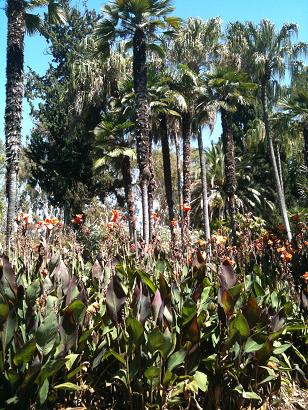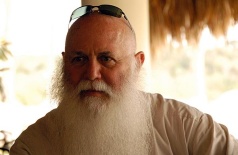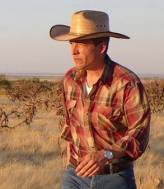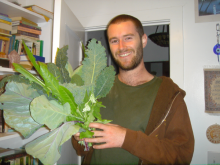PDC- Permaculture Design Course
Permaculture Design Certificate (PDC) Course
The Los Angeles Arboretum & Botanic Garden
Oct.2 - Nov. 21, 2010
8am - 6pm
Contact for more info. Caitlin Bergman
<cait_bergman@yahoo.com>
Permaculture is sustainable land use design based on ecologically
sound principles. Its aim is harmonizing habitats and
inhabitants, creating richly productive food systems.
Permaculture is an eye-opening set of principles and concepts
that make a tremendous impact on communities. This experiential
course is a practical, project-oriented, support training. It
moves beyond theory to hands-on applications. Participants will
become certified permaculture designers upon successful
completion.
More than a gardening program, this lively course covers:
- Habitat restoration
- Rapid soil rebuilding
- Thriving food production
- Rain and grey water use
- Community integration
- Earthworks
- Sustainability
- Urban food forestry
- Recognizing landscape patterns
COURSE DATES: 8 Saturdays and 1 Sunday,
8am-6pm
8 Saturdays (Oct. 2, 9, 16, 23, 30, Nov. 6,
13, 20)
1 Sunday (Nov. 21)
 WHY:
WHY: This course is fun and applicable to real world
experience, giving participants a solid foundation in permaculture
design. Our work changes lives as it changes the
Earth.
An environment of support and unity between classmates
is fostered, which will enable collaboration in design
projects and a strong network of fellow designers. The subjects
to be covered have the potential to generate green jobs and abundance
of all kinds.
COURSE FEE: $200 non-refundable holds deposit due
by September 13th deducted from $1200 tuition. Be sure
to sign up early as course is limited to 30 registrants.
INSTRUCTORS:
 Warren Brush
Warren Brush is a certified Permaculture designer and
teacher as well as a mentor and storyteller. He has worked for over 20
years in inspiring people of all ages to discover, nurture and express
their inherent gifts while living in a sustainable manner. He is
co-founder of Quail Springs Learning Oasis & Permaculture Farm,
Wilderness Youth Project, Mentoring for Peace, and Trees for
Children. He works extensively in Permaculture education and
sustainable systems design in North America and in Africa through his
design firm, True Nature Design. He can be reached through email at
w@quailsprings.org or by calling his office
at 805-886-7239.
 Howard Yana-Shapiro, PhD is the rare
visionary who is also a success in his own lifetime. He is
currently the global director of plant science and external research
for Mars, Inc. Howard has guided Mars toward the goal of 100%
sustainably-sourced carob production since joining up with the company
in the latter 1990┼ňs.
Howard Yana-Shapiro, PhD is the rare
visionary who is also a success in his own lifetime. He is
currently the global director of plant science and external research
for Mars, Inc. Howard has guided Mars toward the goal of 100%
sustainably-sourced carob production since joining up with the company
in the latter 1990┼ňs.
His more than 35 years working with
sustainable agricultural and agroforestry systems, plant systems,
plant genetics, and food production systems in Europe, Asia, Africa,
Mesoamerica, South America, and in the United States have led to his
being a party to functional ecological enhancements the world over.
During his years as a geneticist, he released over sixty lines
of maize, helianthus, and tagetes into the public
domain.
In 2008 Howard was named a fellow of the
World Agroforestry Centre, and was lead author on the biotechnology
and biodiversity chapter of the International Assessment of
Agricultural Science and Technology for Development,
a study initiated by the World Bank.
Howard's latest ventures include
directing Mars' global cacao genome sequencing work (in conjunction
with IBM and the USDA's agricultural research service)
and engaging the 17 heads of state that comprise the African
Union to implement an economically sound ecological roadmap for
Africa.
 Lois Arkin
Lois Arkin is the Executive Director of CRSP (the
Cooperative Resources & Services Project), the nonprofit
organization she founded in 1980 as a resource center for small
ecological cooperative communities. In 1993, she co-founded the
Los Angeles
Eco-Village. Lois' current focus is CRSP' emerging
Institute for Urban Ecovillages which provides training, education and
resources for urban ecological cooperative community
development.
Lois is the former editor for the "Ecovillage Living" column
in Communities Magazine, represents the Western U.S. with the
Ecovillage Network of the Americas, and is on the board of the Global
Village Institute as well as on the Community Advisory Committee of
the Wilshire Center/Koreatown Redevelopment Area. A co-founder of the
Beverly-Vermont Community Land Trust, she lives and works in LA
Eco-Village, and is passionate about reducing auto use in L.A.
Lois co-authored and co-edited Sustainable Cities:
Concepts and Strategies for Eco-City Development which won an
American Planning Association-L.A. Section award. A second book she
co-authored and co-edited, Cooperative Housing Compendium:
Resources for Collaborative Living, was published by the
Center for Cooperatives at U.C. Davis. She received a second award
from the APA-L.A. Section for Advocacy Planning in the late 1980s,
and recently the L.A. Eco-Village received the Local Hero Award from
the Returned Peace Corps Members of Los Angeles.

Anaturalist from a young age, and a childhood witness to rapid
land degradation in one of the world's biodiversity hotspots,
Owen Hablutzel has since taken a whole-systems approach to
the ecological design and management of ranches, farms, and
landscapes; working with landowners and communities to address this
global issue. Having worked and lived in Africa, Australia
, and much of the western United States , he received
world-class training in Permaculture systems-design science through
Bill Mollison and Geoff Lawton, and Keyline Design« under mentor
Darren Doherty. His ecological work includes Keyline soil
building and water harvesting; building swales, farm dams, riparian
and wildlife buffer strips; integrated whole farm planning; watershed
restoration, dryland afforestation, grazing planning, garden and food
forest extension; gully rehabilitation; greening desertified
rangelands, Holistic Management« and more. Integrating a broad
spectrum of practical, leading-edge solutions to the global ecological
crisis, Owen serves as director for the
Permaculture Research Institute
USA, while growing his ecological consulting and education
businesses. Owen holds a masters in Eastern Philosophy from St.
John's College, New Mexico.
 Kirstie Stramler
Kirstie Stramler holds a Bachelor's in Geophysics
from UC Santa Barbara and a Doctorate in Atmospheric Science from
Columbia University, where she apprenticed with climate scientists
Anthony Del Genio and William Rossow at the NASA Goddard Institute for
Space Studies
(NASA/GISS).
After working at a government laboratory for a few
years, Kirstie's impatience with the glacial pace of scientific
revolutions compelled her to leave the field of basic scientific
research in pursuit of solutions that have the potential to stabilize
the earth's fluid envelope and failing ecosystems while
simultaneously allowing humans to thrive. After realizing that
Permaculture is an ecological design system that has such potential,
Kirstie trained with Geoff Lawton for the Permaculture Design Course,
and with Rosemary Morrow for the Permaculture Aid Worker Course.
Kirstie is currently developing sustainability curricula for
schools and communities, researching alternative economic systems, and
is a producer at
Permaculture.TV.

A permaculture designer and educator from San Francisco,
California,
Lindsay Dailey is part of a new generation of
permaculture teachers working on the edge of what permaculture can do
to restore landscapes and create abundance. Lindsay has
worked passionately in the realm of sustainability education since
2001. She is a founding member of
Villa Sobrante, an urban permaculture and
natural building demonstration site and community in the East Bay. She
also founded
Earth Repair, a regenerative design and
education firm inspiring people to build topsoil and rehydrate the
land while growing useful and edible plants.
Lindsay works extensively in a range of bioregions, farms,
watersheds and city environments, and is a leading advocate and
educator on how permaculture principles can provide food security,
build community, and heal our planet.
 Gavin Raders
Gavin Raders is a co-founder and volunteer-executive
director of
Planting Justice, a social justice
activist, and a permaculture demonstrator/teacher. Gavin
has gone through extensive training with some of the most
inspiring and effective permaculture teachers in the world: Geoff
Lawton, Penny Livingston-Stark, Brock Dolman, Darren Dougherty, and
Nik Bertulis.
Prior to co-founding Planting Justice, Gavin interned at the
Regenerative Design Institute in 2007-2008, studied cultural
anthropology at UC Berkeley, and organized on a range of anti-war,
anti-nuclear, environmental and human rights issues, including
knocking on nearly 30,000 doors in California, New Mexico,
Colorado, and Nevada as a community organizer with Peace Action West.
In India, Gavin studied and advocated for the right to water and
against its privatization by massive water corporations (such as
Coca-Cola), which you can read about in his
Berkeley
Undergraduate Journal publication.
Gavin thus came to permaculture and ecological design through a
social justice framework which recognizes the right of all people to
peace, security, housing, healthy food, clean water, jobs and
healthcare, and the rights of future generations to a just and livable
world. For this to happen, he believes that Americans need to
understand and respect the intimate connection and the shared fate we
have with all people and all life on this planet, and organize
effectively on the local level to come up with replicable and
effective solutions to the range of hardships and oppressions we
currently face. Gavin explained Planting Justice's socially
and ecologically just philosophy and successful business model to a
rapt group of food justice activists at this year's US Social
Forum, and encouraged his audience to replicate Planting Justice's
efforts in their own locales
[link to watch videos of Gavin at USSF 2010].
 WHY: This course is fun and applicable to real world
experience, giving participants a solid foundation in permaculture
design. Our work changes lives as it changes the
Earth.
WHY: This course is fun and applicable to real world
experience, giving participants a solid foundation in permaculture
design. Our work changes lives as it changes the
Earth. WHY: This course is fun and applicable to real world
experience, giving participants a solid foundation in permaculture
design. Our work changes lives as it changes the
Earth.
WHY: This course is fun and applicable to real world
experience, giving participants a solid foundation in permaculture
design. Our work changes lives as it changes the
Earth. Warren Brush is a certified Permaculture designer and
teacher as well as a mentor and storyteller. He has worked for over 20
years in inspiring people of all ages to discover, nurture and express
their inherent gifts while living in a sustainable manner. He is
co-founder of Quail Springs Learning Oasis & Permaculture Farm,
Wilderness Youth Project, Mentoring for Peace, and Trees for
Children. He works extensively in Permaculture education and
sustainable systems design in North America and in Africa through his
design firm, True Nature Design. He can be reached through email at w@quailsprings.org or by calling his office
at 805-886-7239.
Warren Brush is a certified Permaculture designer and
teacher as well as a mentor and storyteller. He has worked for over 20
years in inspiring people of all ages to discover, nurture and express
their inherent gifts while living in a sustainable manner. He is
co-founder of Quail Springs Learning Oasis & Permaculture Farm,
Wilderness Youth Project, Mentoring for Peace, and Trees for
Children. He works extensively in Permaculture education and
sustainable systems design in North America and in Africa through his
design firm, True Nature Design. He can be reached through email at w@quailsprings.org or by calling his office
at 805-886-7239. Howard Yana-Shapiro, PhD is the rare
visionary who is also a success in his own lifetime. He is
currently the global director of plant science and external research
for Mars, Inc. Howard has guided Mars toward the goal of 100%
sustainably-sourced carob production since joining up with the company
in the latter 1990┼ňs.
Howard Yana-Shapiro, PhD is the rare
visionary who is also a success in his own lifetime. He is
currently the global director of plant science and external research
for Mars, Inc. Howard has guided Mars toward the goal of 100%
sustainably-sourced carob production since joining up with the company
in the latter 1990┼ňs.  Lois Arkin is the Executive Director of CRSP (the
Cooperative Resources & Services Project), the nonprofit
organization she founded in 1980 as a resource center for small
ecological cooperative communities. In 1993, she co-founded the Los Angeles
Eco-Village. Lois' current focus is CRSP' emerging
Institute for Urban Ecovillages which provides training, education and
resources for urban ecological cooperative community
development.
Lois Arkin is the Executive Director of CRSP (the
Cooperative Resources & Services Project), the nonprofit
organization she founded in 1980 as a resource center for small
ecological cooperative communities. In 1993, she co-founded the Los Angeles
Eco-Village. Lois' current focus is CRSP' emerging
Institute for Urban Ecovillages which provides training, education and
resources for urban ecological cooperative community
development. Anaturalist from a young age, and a childhood witness to rapid
land degradation in one of the world's biodiversity hotspots,
Owen Hablutzel has since taken a whole-systems approach to
the ecological design and management of ranches, farms, and
landscapes; working with landowners and communities to address this
global issue. Having worked and lived in Africa, Australia
, and much of the western United States , he received
world-class training in Permaculture systems-design science through
Bill Mollison and Geoff Lawton, and Keyline Design« under mentor
Darren Doherty. His ecological work includes Keyline soil
building and water harvesting; building swales, farm dams, riparian
and wildlife buffer strips; integrated whole farm planning; watershed
restoration, dryland afforestation, grazing planning, garden and food
forest extension; gully rehabilitation; greening desertified
rangelands, Holistic Management« and more. Integrating a broad
spectrum of practical, leading-edge solutions to the global ecological
crisis, Owen serves as director for the Permaculture Research Institute
USA, while growing his ecological consulting and education
businesses. Owen holds a masters in Eastern Philosophy from St.
John's College, New Mexico.
Anaturalist from a young age, and a childhood witness to rapid
land degradation in one of the world's biodiversity hotspots,
Owen Hablutzel has since taken a whole-systems approach to
the ecological design and management of ranches, farms, and
landscapes; working with landowners and communities to address this
global issue. Having worked and lived in Africa, Australia
, and much of the western United States , he received
world-class training in Permaculture systems-design science through
Bill Mollison and Geoff Lawton, and Keyline Design« under mentor
Darren Doherty. His ecological work includes Keyline soil
building and water harvesting; building swales, farm dams, riparian
and wildlife buffer strips; integrated whole farm planning; watershed
restoration, dryland afforestation, grazing planning, garden and food
forest extension; gully rehabilitation; greening desertified
rangelands, Holistic Management« and more. Integrating a broad
spectrum of practical, leading-edge solutions to the global ecological
crisis, Owen serves as director for the Permaculture Research Institute
USA, while growing his ecological consulting and education
businesses. Owen holds a masters in Eastern Philosophy from St.
John's College, New Mexico. Kirstie Stramler holds a Bachelor's in Geophysics
from UC Santa Barbara and a Doctorate in Atmospheric Science from
Columbia University, where she apprenticed with climate scientists
Anthony Del Genio and William Rossow at the NASA Goddard Institute for
Space Studies (NASA/GISS).
After working at a government laboratory for a few
years, Kirstie's impatience with the glacial pace of scientific
revolutions compelled her to leave the field of basic scientific
research in pursuit of solutions that have the potential to stabilize
the earth's fluid envelope and failing ecosystems while
simultaneously allowing humans to thrive. After realizing that
Permaculture is an ecological design system that has such potential,
Kirstie trained with Geoff Lawton for the Permaculture Design Course,
and with Rosemary Morrow for the Permaculture Aid Worker Course.
Kirstie is currently developing sustainability curricula for
schools and communities, researching alternative economic systems, and
is a producer at Permaculture.TV.
Kirstie Stramler holds a Bachelor's in Geophysics
from UC Santa Barbara and a Doctorate in Atmospheric Science from
Columbia University, where she apprenticed with climate scientists
Anthony Del Genio and William Rossow at the NASA Goddard Institute for
Space Studies (NASA/GISS).
After working at a government laboratory for a few
years, Kirstie's impatience with the glacial pace of scientific
revolutions compelled her to leave the field of basic scientific
research in pursuit of solutions that have the potential to stabilize
the earth's fluid envelope and failing ecosystems while
simultaneously allowing humans to thrive. After realizing that
Permaculture is an ecological design system that has such potential,
Kirstie trained with Geoff Lawton for the Permaculture Design Course,
and with Rosemary Morrow for the Permaculture Aid Worker Course.
Kirstie is currently developing sustainability curricula for
schools and communities, researching alternative economic systems, and
is a producer at Permaculture.TV. A permaculture designer and educator from San Francisco,
California, Lindsay Dailey is part of a new generation of
permaculture teachers working on the edge of what permaculture can do
to restore landscapes and create abundance. Lindsay has
worked passionately in the realm of sustainability education since
2001. She is a founding member of Villa Sobrante, an urban permaculture and
natural building demonstration site and community in the East Bay. She
also founded Earth Repair, a regenerative design and
education firm inspiring people to build topsoil and rehydrate the
land while growing useful and edible plants.
A permaculture designer and educator from San Francisco,
California, Lindsay Dailey is part of a new generation of
permaculture teachers working on the edge of what permaculture can do
to restore landscapes and create abundance. Lindsay has
worked passionately in the realm of sustainability education since
2001. She is a founding member of Villa Sobrante, an urban permaculture and
natural building demonstration site and community in the East Bay. She
also founded Earth Repair, a regenerative design and
education firm inspiring people to build topsoil and rehydrate the
land while growing useful and edible plants.  Gavin Raders is a co-founder and volunteer-executive
director of Planting Justice, a social justice
activist, and a permaculture demonstrator/teacher. Gavin
has gone through extensive training with some of the most
inspiring and effective permaculture teachers in the world: Geoff
Lawton, Penny Livingston-Stark, Brock Dolman, Darren Dougherty, and
Nik Bertulis.
Gavin Raders is a co-founder and volunteer-executive
director of Planting Justice, a social justice
activist, and a permaculture demonstrator/teacher. Gavin
has gone through extensive training with some of the most
inspiring and effective permaculture teachers in the world: Geoff
Lawton, Penny Livingston-Stark, Brock Dolman, Darren Dougherty, and
Nik Bertulis.  Caitlin Bergman is a permaculture designer, consultant,
and educator. She is The Los
Angeles Arboretum and Botanic Garden's full-time permaculturist
and Lead Designer of SayPermaculture!.
Caitlin works closely with various colleges, schools, and residences
to educate students and homeowners about putting permaculture into
action. Working with both an international and local clientele,
she is passionate about green living, caring for the earth, and
providing students with warm, solution-oriented information. She
delights in linking others to this rapidly-growing global
sustainability movement.
Caitlin Bergman is a permaculture designer, consultant,
and educator. She is The Los
Angeles Arboretum and Botanic Garden's full-time permaculturist
and Lead Designer of SayPermaculture!.
Caitlin works closely with various colleges, schools, and residences
to educate students and homeowners about putting permaculture into
action. Working with both an international and local clientele,
she is passionate about green living, caring for the earth, and
providing students with warm, solution-oriented information. She
delights in linking others to this rapidly-growing global
sustainability movement.